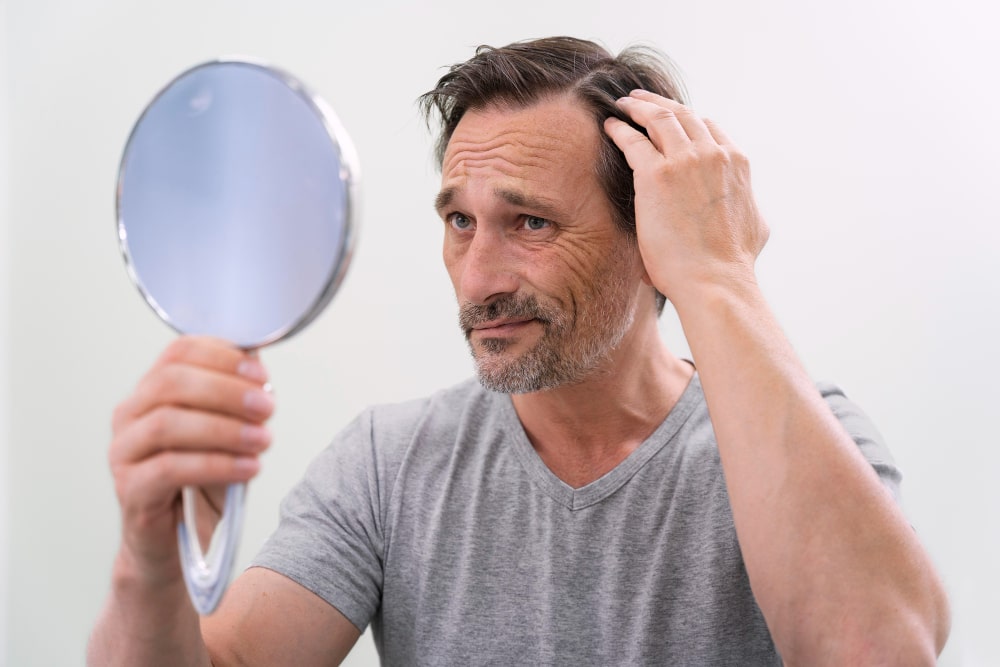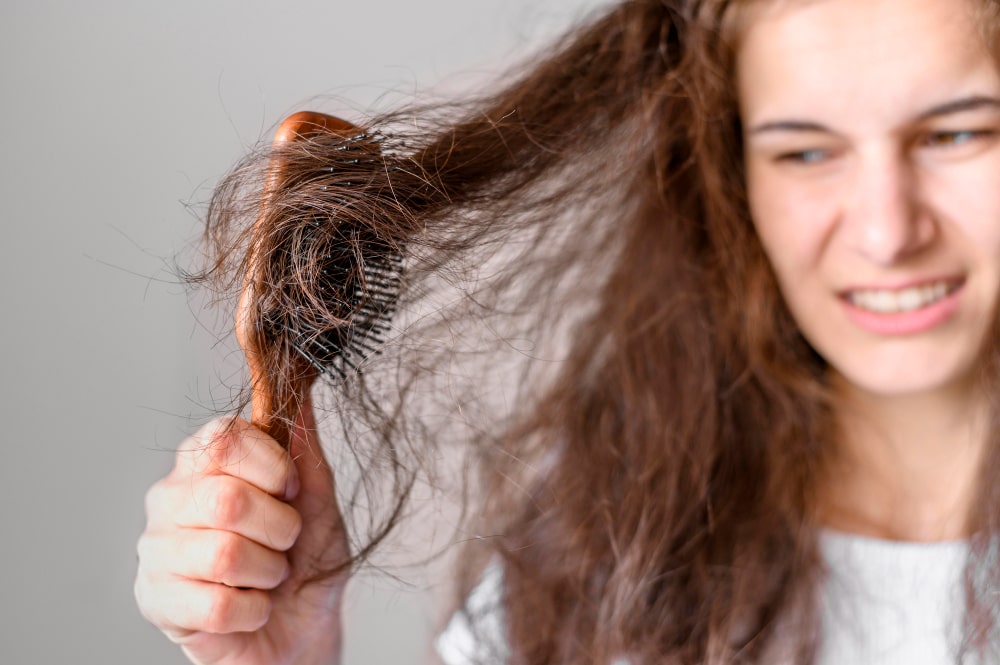Calcium is an essential mineral for human health, but what does it have to do with hair? The importance of calcium in keeping our physical and mental well-being can’t be overstated. Calcium plays a vital role in maintaining the structure and strength of bones, teeth, muscles, blood vessels, and even skin. This means that when we don’t get enough calcium in our diet, it can have disastrous effects on these areas of our body. When it comes to hair health, calcium may play an important role. Low levels of this mineral can result in thinning and weakening of hair follicles, resulting in hair loss. This article will explore the connection between calcium and hair, how to identify low calcium cause hair loss, and what can be done to prevent it.
The Connection Between Calcium and Hair Health
Calcium is an essential mineral for healthy hair growth. It helps keep the scalp tissue strong and supple so the hair follicles are well-nourished. As with other body tissues, calcium is necessary to activate enzymes and hormones that control the functioning of hair follicles. When the scalp lacks calcium, the hair growth cycle is affected, leading to weakened or broken hair due to lack of nourishment.
Calcium also helps maintain the integrity of cells in the scalp so that they can properly absorb nutrients and exchange gases with other cells. If this process isn’t working as it should, the hair follicles can become damaged and cause to hair loss.


Read More: Lack of Sleep Cause Hair Loss : Tips For Better Sleep Habits
Effects of Low Calcium Levels on Hair
Low calcium levels can have a significant effect on hair health. Here are some ways that calcium deficiency affects the structure and growth cycle of your hair:
1) Hair Structure and Growth Cycle
The hair structure is affected by calcium levels. When the scalp doesn’t have enough of this mineral, it can lead to brittle and dry hair. This type of damage leads to thinning and weakened hairs that are more likely to break before they can reach their full length.
Calcium also affects the growth cycle of your hair. Without sufficient calcium, the growth cycle of the hair can be disrupted. This means new hairs will grow less efficiently, and existing hairs may not reach their full length before they start to thin and break off.
2) Low Calcium and Hair Loss
When calcium levels are too low, it can cause to a type of hair loss known as telogen effluvium. This form of hair loss is caused by a disruption in the growth cycle of the hair follicles, leading to an increased amount of hairs entering into the resting phase instead of actively growing. The result is noticeable thinning and shedding over time.
Read More: Can Selenium Cause Hair Loss : Everything You Need To Know
Symptoms of Calcium Deficiency
There are a few signs that can indicate that you may have a calcium deficiency which cause hair loss. These symptoms include:
- Dry and thinning hair
- Muscles, cramps, or twitches
- Fatigue and exhaustion
- Weak nails and broken bones
- Memory loss or confusion
- Headaches and dizziness
If you experience any of these symptoms, seeking medical advice and having your calcium levels checked is important.


Read More: Hair loss on legs: Causes, Suggestions & Treatment
Factorizing Low Calcium Levels
There are several factors that can contribute to low calcium levels in the body. These include dietary choices, medical conditions, and certain medications.
Dietary Factors
A diet low in calcium can lead to a deficiency over time. Calcium-rich foods include dairy products such as milk and cheese, green leafy vegetables, nuts and seeds, fish with edible bones (such as sardines or salmon), and fortified cereals and juices. Eating enough of these foods is essential for maintaining healthy calcium levels.
Medical Conditions
Certain medical conditions such as kidney disease, celiac disease, or gastrointestinal disorders can interfere with the body’s ability to absorb and process calcium, leading to a deficiency. Additionally, hormonal imbalances due to pregnancy or menopause can also affect calcium absorption.
Medications
Some medications can also reduce how much calcium is absorbed by the body. These include corticosteroids, some diuretics and anticonvulsants. If you are taking any of these medications, discussing with your doctor the potential risk of developing a calcium deficiency is important.
Diagnosing Calcium Deficiency
If you suspect that you may have a calcium deficiency, it is important to get it diagnosed. This can be done through a simple blood test which will measure the amount of calcium in your body. Your doctor may also order other tests, such as an X-ray or bone density scan, to assess the health of your bones.
Read More: Does Smoking Cause Hair Loss? You Should Know in (2023)
Treating Low Calcium and Hair Loss
Once a calcium deficiency has been diagnosed, it can be treated in a few ways.
1) Calcium-Rich Diet
The most important and beneficial way to address a deficiency is through your diet. Foods that are high in calcium include dairy products, leafy greens, seafood, nuts, seeds, and fortified foods such as cereals and juices.
2) Supplements
Your doctor may also recommend taking calcium supplements if you are not able to get enough calcium through your diet. It is important to speak to your doctor before starting any supplement regime, as too much calcium can be harmful.
3) Addressing Underlying Health Issues:
If a medical condition is causing calcium deficiency, it is important to address this with your doctor. Treating the underlying issue may help improve your calcium levels and stop further hair loss.
4) Hair Care Practices:
In addition to the above treatments, it is important to practice good hair care habits. This includes using gentle shampoos and conditioners, avoiding excessive heat styling, and using protective products such as oils or serums. These practices can help keep your hair healthy despite low calcium levels.
Preventing Calcium Deficiency:
Calcium deficiency can be prevented by making sure to get enough of the mineral in your diet, as well as addressing any underlying medical conditions that could be contributing to it. Additionally, staying active and limiting alcohol consumption can help maintain healthy levels of calcium in the body.
Read More: Diabetes Hair Loss: Causes, Symptoms, Treatment options, FAQs
Conclusion
In conclusion, calcium is essential for healthy hair growth and strength. Low levels of this mineral can result in thinning and weakening of hair follicles, resulting in hair loss. Proper dietary intake, supplemented with calcium supplements if necessary, is key to preventing calcium deficiency and its associated effects on the body. Additionally, addressing any underlying medical conditions that could be contributing to the deficiency is important for long-term hair health.
FAQs
A: Low calcium levels can cause to weak and brittle hair and hair loss that is more prone to breakage. It can also interfere with the absorption of other minerals necessary for healthy hair growth.
A: Common signs include fatigue, muscle cramps, poor appetite, dry skin, brittle nails, and hair loss.
A: Foods high in calcium include dairy products such as milk and cheese; green leafy vegetables; nuts and seeds; fish with edible bones (such as sardines or salmon); and fortified cereals and juices.
A: Eating a diet rich in calcium, addressing any underlying medical conditions that could be contributing to the deficiency, taking calcium supplements if necessary, staying active, and limiting alcohol consumption can help maintain healthy levels of calcium in the body.
A: No, other minerals, including iron and zinc, are also essential for strong and healthy hair growth.
A: Yes, calcium supplements can be taken safely under medical supervision. It is important to follow the recommended dosage and always check with a doctor before taking supplements.

